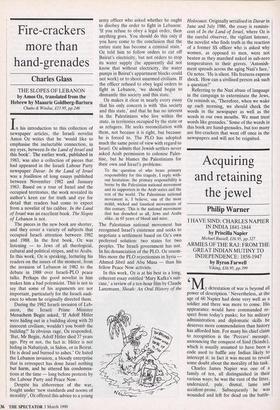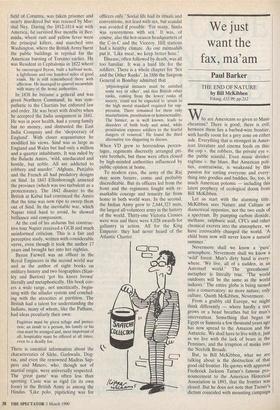Acquiring and retaining the jewel
Philip Warner
I HAVE SIND: CHARLES NAPIER IN INDIA 1841-1844 by Priscilla Napier
Michael Russell, £16.95, pp.327
ARMIES OF THE RAJ: FROM THE GREAT INDIAN MUTINY TO INDEPENDENCE: 1858-1947 by Byron Farwell
Viking, £16.95, pp.399
My detestation of war is beyond all power of description.' Nevertheless, at the age of 60 Napier had done very well as a soldier and there was more to come. His appearance would have commanded re- spect from today's punks; for his military administration and diplomatic skills he deserves more commendation than history has afforded him. For many his chief claim to recognition is the 'Peccavi' message, announcing the conquest of Sind (Scinde), which is usually assumed to have been a code used to baffle any Indian likely to intercept it: in fact it was meant to reveal some doubt about the morality of his task. Charles James Napier was one of a family of ten, all distinguished in their various ways; he was the runt of the litter, undersized, pale, dismal, lame and accident-prone. Subsequently he was wounded and left for dead on the battle- field of Corunna, was taken prisoner and nearly murdered but was rescued by Mar- shal Ney. During the 1812-1814 war with America, he survived five months in Ber- muda, where rum and yellow fever were the principal killers, and marched into Washington, where the British Army burnt the public buildings in reprisal for the American burning of Toronto earlier. He was Resident in Cephalonia in 1822 where
he encouraged Byron, built a harbour mole, a lighthouse and one hundred miles of good roads. He is still remembered there with affection. He managed to quarrel meanwhile with many of the home authorities.
In 1838 he became a general and was given Northern Command; he was sym- pathetic to the Chartists but enforced law and order. He was beset with doubts when he accepted the India assignment in 1841. He was in poor health, had a young family but no money, and distrusted the East India Company and the `shopocracy of England'. With closer acquaintance he modified his views. Sind was as large as England and Wales but had only a million and a quarter inhabitants. It was ruled by the Baluchi Amirs, 'wild, uneducated and hostile, but noble. All are addicted to robbery and murder.' Afghans, Punjabis and the French all had predatory designs on Sind. In 1843 Ellenborough annexed the province (which was too turbulent as a protectorate). The 1842 disaster to the British at Kabul had convinced the Amirs that the time was now ripe to sweep them out of Sind. In the inevitable war, which Napier tried hard to avoid, he showed brilliance and compassion.
At the end of his arduous but construc- tive tour Napier received a GCB and much uninformed criticism. This is a fair and perceptive study, written with considerable verve, even though it took the author 17 years and brought her into her eighties.
Byron Farwell was ark officer in the Royal Engineers in the second world war and as the author of eight books on military history and two biographies (Stan- ley and Burton) 'got his knees brown' literally and metaphorically. His book cov- ers a wide range, not uncritically, begin- ning with the silladar system and conclud- ing with the atrocities at partition. The British had a talent for understanding the Indians, many of whom, like the Pathans, had ideas peculiarly their own:
Fugitives must be given refuge and protec- tion; an insult to a person, his family or his clan must be avenged and, most important of all, hospitality must be offered at all times, even to a deadly foe.
There is essential information about the characteristics of Sikhs, Garhwalis, Dog- ras, and even the renowned Madras Sap- pers and Miners, who, though not of martial origin, were universally respected. The 'great game' was often less than sporting. Caste was as rigid (in its own form) in the British Army as among the Hindus. 'Like polo, pigsticking was for officers only.' Social life had its rituals and conventions, not least with sex, but scandal was avoided if possible. 'For many, Simla was synonymous with sex.' It was, of course, also the hot-season headquarters of the C-in-C and the Viceroy. Hill stations had a healthy climate. As one memsahib put it, 'Like meat, we keep better here.'
Disease, often followed by death, was all too familiar. It was a hard life for the soldiers. There is a whole chapter for 'Sex and the Other Ranks'. In 1886 the Surgeon General in Bombay admitted that
'physiological instincts must be satisfied some way or other', and that British other ranks, coming from the lower ranks of society, could not be expected to 'attain to the high moral standard required for sup- pression. There remained for them only masturbation, prostitution or homosexuality. The former, as is well known, leads to disorders of both body and mind, while prostitution exposes soldiers to the fearful dangers of venereal.' He found the third alternative too disgusting to discuss.
When VD grew to horrendous percen- tages, regiments discreetly arranged pri- vate brothels, but these were often closed by high-minded authorities influenced by public opinion at home.
To modern eyes, the army of the Raj may seem bizarre, comic and probably discreditable. But its officers led from the front and the regiments fought with re- markable courage and tenacity far from home in both world wars. In the second, the Indian Army grew to 2,644,323 men, the largest all-volunteer army in the history of the world. Thirty-one Victoria Crosses were won and there were 4,028 awards for gallantry in action. All for the King Emperor: they had never heard of the Atlantic Charter.



























































 Previous page
Previous page